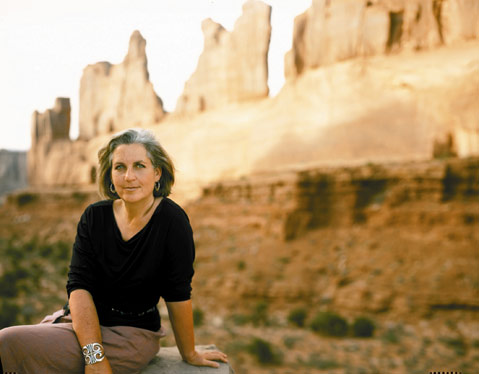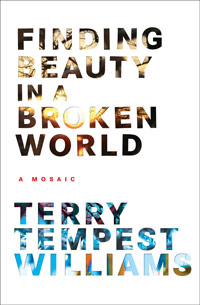Terry Tempest Williams to Speak in S.B.
Author of Finding Beauty in a Broken World Shares Insights on Politics and Peace

Terry Tempest Williams’s new book, Finding Beauty in a Broken World, resists easy classification. An impassioned, idiosyncratic work of nonfiction, it offers a triptych of explorations into what it means to be human in world full of ecological damage and spiritual and political fragmentation. First, she travels to Ravenna, Italy, to learn the art of mosaic making (it’s harder than she thought it would be); next, she observes (and takes extensive field notes about) a prairie dog community in Bryce, Utah; and, finally, she travels to Rwanda, where she joins survivors of the 1994 genocide to make a memorial for its victims. Williams mines each of these disparate experiences for metaphor and broader meaning; the result is a vigorous, emotionally demanding investigation into the link between beauty and destruction.
For over three decades, Williams has been writing acclaimed works of fiction and nonfiction about family, literature, spirituality, and the natural world; in recent years, she has written extensively about politics under the Bush administration. I spoke to her in advance of her Santa Barbara appearance.

Finding Beauty in a Broken World is elegiac, literary nonfiction. You’ve been writing widely about political issues since 9/11; what led you to this book? I was in Washington on 9/11, when the Pentagon was hit, and I felt the terror of that in my bones. I made the decision to speak out, but, eventually, I realized that my rhetoric had become as brittle as those I was opposing, and I needed to find my poetry again. That was the impulse that started me on this eight-year path of inquiry.
Why is it important to maintain a sense of poetry about our current political moment? Well, I think we’re hungry for a different kind of story. I liked when [Barack] Obama said we’re better than this, and something in us is stirring. I don’t think that’s about Republicans or Democrats. I think that’s our desire, as Americans. And I don’t think we’re being represented by the current administration, in that respect, in any way. We’re being ruled by fear and deception, rather than engagement and respect.
Literature is a good antidote to political anxiety. I read the section on prairie dogs after a day of frenzied political news, and it helped me slow down, although I have to say it was difficult, at first, to make the transition from reading about the intrigues of the presidential campaign to the habits of prairie dogs. We live in such a fragmented, distracted world that I think we’ve forgotten how to be still. And I think I saw that in myself. Those first two or three days [of observing the prairie dogs] I thought I was going to die. I thought, “There is nothing going on.” And then, suddenly, after the third day, after my mind slowed down, suddenly everything was happening, and then the prairie dogs were no longer an abstraction. They had a real presence, and I wanted the reader to go through what I did, and feel that sense of engagement through time. I think we’ve forgotten that capacity to observe, and be still, and to be present. In many ways, this book is about how to be present. It’s about how to bear witness, and how when we bear witness it is not a passive act.
For me the big theme of Finding Beauty in a Broken World is the difference between paradox and dichotomy. It seems to me it’s a book much more about paradox, much more about trying to find the conversation between disparate things, finding where the tesserae fit into the mosaic, I guess, than it is about separating them out from each other. I think that’s exactly right. It strikes me that the world is a paradox, but that’s also where its grace is. The image I have as you say that is on one hand we hold these things, and on the other hand we hold these other things, and when put those hands together it becomes a gesture of prayer.
Again, I think it goes back to the question of where we find ourselves in this country. We’re really seduced and deceived into believing that it’s black or white, yes or no, Republican or Democrat. I think the world is much more beautiful than that, and much more complicated than that, and much richer than that. And I think this book is an attempt to ask, “What is community, how do we create it, and what is it comprised of?” I think it is that metaphor of a mosaic, of taking that which is broken and making something whole. For me, the revelatory moment was realizing that “finding beauty in a broken world” is really creating beauty in the world we find.
4•1•1
Terry Tempest Williams will speak at the Santa Barbara Museum of Natural History’s Fleischmann Auditorium on Monday, October 13, at 7:30 p.m. For tickets or more information, call 893-3535 or visit artsandlectures.ucsb.edu.



